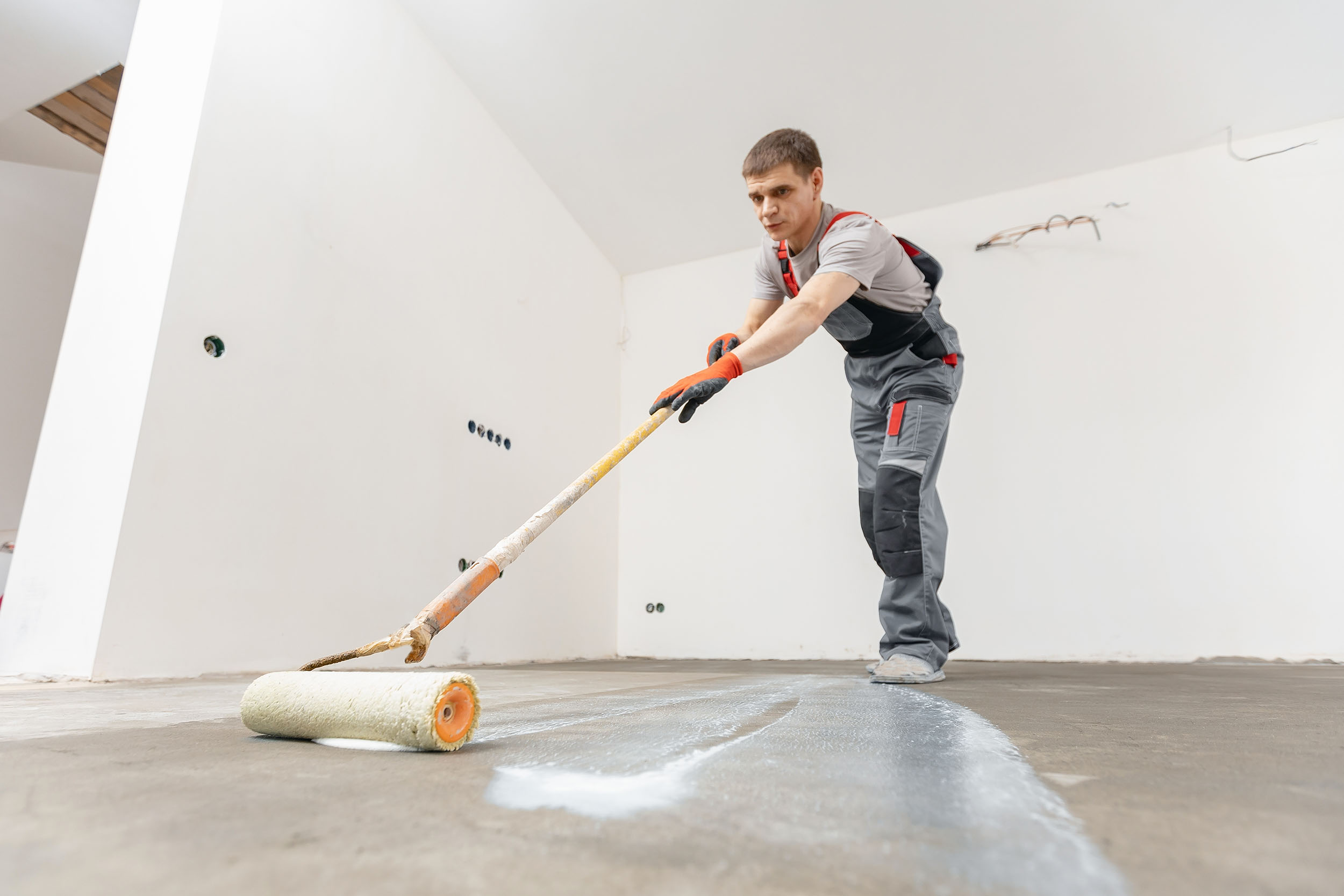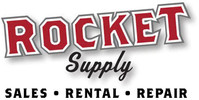Industrial Epoxy Flooring is a high-performance floor system engineered to withstand the most demanding operational environments. For warehouses, manufacturing plants, commercial kitchens, and other heavy-duty facilities in the Denver area, this robust flooring solution is often the critical line of defense for the underlying concrete slab.
Choosing and installing the correct industrial floor system is a specialized job. This guide from your local Denver experts at Rocket Supply will walk you through what industrial epoxy flooring is, why proper preparation is non-negotiable, and how it can solve major flooring challenges in your facility.
What Exactly is Industrial Epoxy Flooring?
Industrial epoxy flooring systems are multi-layered coatings composed of an epoxy resin and a polyamine hardener. When these two components are mixed, they undergo a chemical reaction (curing) to form a rigid, durable plastic material that is seamlessly bonded to the concrete substrate.
This seamless, non-porous finish provides a superior level of protection and durability far exceeding that of bare concrete or thin, single-coat sealers.
How is it different from residential or commercial epoxy?
The key distinction between residential, commercial, and industrial epoxy lies in the thickness, formulation, and primary focus.
| Type of Epoxy | Typical Thickness (mils) | Primary Focus | Use Cases |
| Residential | 8 – 15 | Aesthetics, light-duty protection, easy cleaning | Garages, basements, home gyms |
| Commercial | 15 – 30 | Appearance, moderate traffic, hygiene | Retail stores, offices, showrooms, common areas |
| Industrial | 60 – 120+ (often includes mortars) | Extreme durability, chemical resistance, safety | Warehouses, manufacturing plants, hangars, food processing |
Industrial epoxy floors are significantly thicker, often utilizing mortar epoxies (high aggregate-to-resin ratio) or self-leveling slurries to achieve superior depth, impact resistance, and compressive strength. Their formulation is specifically engineered for maximum resistance to abrasion, harsh chemicals, and heavy point-loads from machinery like forklifts.
Why is Prep the Most Important Part of an Industrial Epoxy Flooring Project?
In the industrial flooring world, proper surface preparation is the single greatest predictor of a coating system’s success or failure. In fact, a lack of, or improper, surface preparation is the number one reason epoxy coatings fail, leading to issues like peeling, blistering, and delamination.
For an industrial environment, the concrete substrate must be clean, dry, level, and possess an adequate surface profile to ensure the epoxy creates a tenacious mechanical bond.
The essential steps for industrial prep include:
- Moisture Testing: Excess moisture in the concrete is epoxy’s greatest enemy, often leading to bubbling and failure. Professional testing (like the relative humidity or calcium chloride test) must be conducted and addressed with a vapor barrier primer if necessary.
- Contaminant Removal: All existing coatings, oil, grease, paint, and contaminants must be completely removed, often requiring specialized degreasers and mechanical methods.
If you are dealing with a previous coating that must be completely removed, consult our comprehensive resource on how to remove epoxy from concrete like a pro to ensure a clean substrate.
- Repair and Leveling: All cracks, spalls, and uneven areas must be professionally repaired and patched to create a smooth, level canvas for the seamless epoxy application.
- Mechanical Abrasion: Unlike residential projects that might use acid etching, industrial prep requires heavy-duty methods like diamond grinding or shot blasting. This process profiles the concrete, creating a rough texture (like coarse sandpaper) that allows the thick epoxy system to deeply penetrate and lock into the concrete’s pores.
Without this meticulous preparation, the robust, industrial-grade epoxy system will never achieve the powerful bond required to withstand decades of high-impact use.
What Flooring Challenges Does Epoxy Solve?

Industrial facilities face unique operational challenges that standard concrete cannot handle. A professionally installed industrial epoxy system is engineered to directly solve these critical issues.
Solving Chemical Spills and Abrasion Damage
Industrial epoxy flooring is a nearly impenetrable, non-porous shield for your concrete.
- Chemical Resistance: Standard concrete is porous and will absorb oils, solvents, caustic cleaners, and industrial chemicals like battery acid, leading to deep staining and deterioration. Epoxy’s cross-linked polymer structure prevents these substances from penetrating the surface, allowing for quick cleanup and protecting the substrate.
- Abrasion and Impact: Industrial settings involve constant friction from heavy wheel traffic (forklifts, pallet jacks) and the potential for dropped tools or equipment. A thick, high-solids industrial epoxy system provides superior resistance to scratching, chipping, and wear, significantly extending the floor’s lifespan.
Improving Safety (Slip Resistance and Line Striping)
Safety is paramount in any industrial facility. Epoxy can be customized to minimize hazards.
- Slip Resistance: A seamless, smooth surface can become slick when wet or exposed to oil. Industrial epoxy can incorporate various anti-slip additives (like quartz aggregate) into the topcoat to create a textured, slip-resistant surface that maintains grip even when spills occur, enhancing worker safety.
- Line Striping and Zones: The customizable nature of epoxy allows for embedded, highly visible safety line striping, walkways, and color-coded zones to designate traffic lanes, forklift routes, and safe working areas, improving facility organization and compliance.
Mitigating Moisture and Vapor Transmission
Moisture vapor transmission (MVT) from the ground up through the concrete is a common issue in Denver and across the country. If MVT is not addressed, it will destroy even a durable coating.
By utilizing specialized moisture vapor barrier primers and thick, dense epoxy layers, a professional industrial installation can effectively mitigate MVT, creating a sealed, stable environment for the floor system to cure and perform for years to come without the risk of bubbling or delamination.
How Long Does Installation and Curing Take?
The installation of a high-performance industrial epoxy floor is a multi-step process that typically requires multiple days to complete, primarily due to the necessary prep and the required cure time between coats.
The Basic Steps: From Prep to Topcoat
A standard industrial epoxy installation follows a strict sequence:
- Preparation (Day 1): Mechanical abrasion (grinding/shot blasting), crack/hole repair, and deep cleaning to create a perfectly profiled surface.
- Primer Coat (Day 1-2): Application of a moisture-tolerant primer to seal the concrete and establish the crucial bond layer. This is followed by a required cure time (often overnight).
- Body/Build Coat (Day 2): Application of the main, thick epoxy layer (often a slurry or mortar) to achieve the required depth and impact resistance. This may include broadcasting aggregate for slip resistance. Another cure time is required.
- Topcoat/Sealer (Day 3): Application of the final clear or pigmented topcoat to seal the system, provide UV stability, and finalize the chemical/abrasion resistance.
Required Safety and Power Check
Before installation begins, it is vital to clear the work area completely of all equipment and personnel. The facility must also ensure adequate ventilation and have the necessary power available for the heavy-duty grinding and shot blasting equipment used by the installation crew.
- Foot Traffic: Light foot traffic is often permitted 24 hours after the final coat.
- Heavy Traffic/Full Service: Industrial environments typically require a full 72-hour cure time before allowing heavy machinery (forklifts, etc.) or chemical exposure to ensure the epoxy system has reached its full chemical and mechanical strength. This downtime must be factored into your project schedule.
See Your Local Denver Experts for Your Industrial Epoxy Flooring Needs
When your industrial facility in Denver needs a flooring solution that delivers extreme durability, superior safety, and unmatched chemical resistance, you need more than a DIY kit you need a professionally engineered system.
At Rocket Supply Denver, we specialize in the materials and equipment needed to create high-performance industrial epoxy flooring that stand up to the Mile High City’s toughest challenges. From initial moisture testing and concrete profiling to the application of thick-build, chemical-resistant topcoats, we supply the products that ensure a successful, long-lasting investment for your facility.
Contact Rocket Supply Denver today to consult with our experts and design the perfect industrial epoxy floor system to protect your operations.
